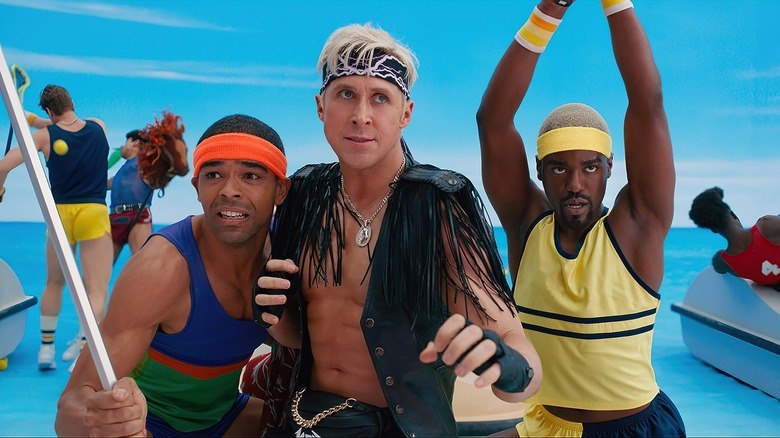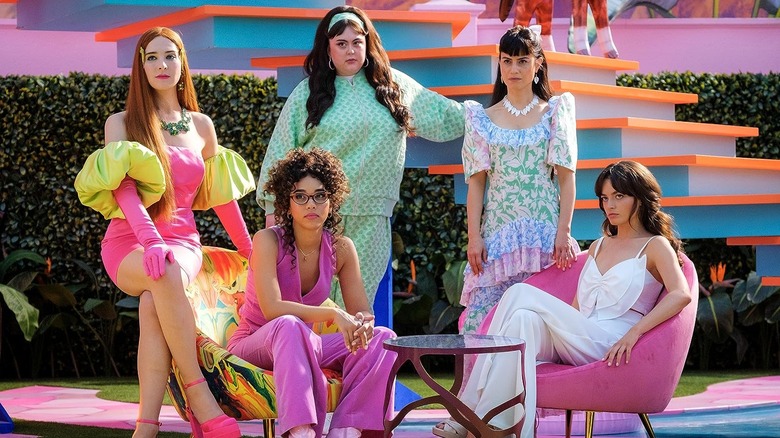Barbie Is Banned In Multiple Countries For Having Kind Of Gay Vibes
"Barbie" isn't really queer cinema ... but it's also not not queer cinema. Indeed, director Greta Gerwig and her collaborators fill their billion-dollar blockbuster (Barbiebuster?) with cheeky innuendos, like having Ryan Gosling and Simu Liu's Kens threaten to "beach" each other off, or Gosling's Ken being checked out by a man when he and Stereotypical Barbie (Margot Robbie) are skating around Venice Beach. In fact, the Kens are more than just a little camp in general, from their incredibly colorful attire to the way they romp around Barbieland pantomiming that they're riding horses "Monty Python"-style.
That being said, there's no explicitly sexual material in "Barbie," assuming the moment where two Kens give Gosling's Ken a peck on his (facial) cheeks during the "I'm Just Ken" musical number doesn't count. Nevertheless, the film has been unexpectedly banned in the countries Kuwait and Oman — places that, according to the Los Angeles Times, have been hyping its arrival by rolling out promotional material in theaters — after being banned in Lebanon and pulled from Algeria following a brief run due to its, for lack of a better description, queer vibes. What's more, some of the residents from these countries interviewed by the LA Times seem to be under the impression that the sexual content in "Barbie" is far less subtextual than it actually is.
For example, a Beruit resident, referred to simply as "Sandra" to protect her identity, has yet to see "Barbie." Still, she said she agreed with the PG-15 rating it received in Saudi Arabia, stating that the sexual material "doesn't have to be highlighted and exaggerated. If I saw a heterosexual couple kissing in the middle of a cafe, I would think, 'Get a room.' This is the same. The time will come when kids have to think of that."
An alarming trend
In Lebanon, which is known for being one of the more progressive countries in the Middle East and has even hosted Pride parades in recent years, "Barbie" was banned after Culture Minister Mohammad Mortada said it contradicts the "moral and religious values as well as the principles of Lebanon" (via CNN). Mortada also said the film "promotes" queerness while using derogatory terms for gay and transgender people (which I won't repeat).
That last comment clearly alludes to the fact that the "Barbie" cast includes transgender multihyphenate Hari Nef as Dr. Barbie, even though her character is never identified as being trans in the film — much like how openly gay actor Kate McKinnon's character, Weird Barbie, is never identified as being a lesbian. It's a situation that recalls the film "Talk to Me" being banned in Kuwait earlier this year on the grounds that it features non-binary actor Zoe Terakes, even though their gender identity is never actually referenced. Films being banned in countries for their queer subject matter is nothing new, obviously, yet this recent practice of banning films for merely including actors from the LGBTQIA+ community represents an alarming expansion of that trend.
Likewise, the various "Barbie" bans are more about the idea of the film than anything else. "'Barbie' has become part of a broader game," noted Ayman Mhanna, the executive director of the Beruit-based rights organization Samir Kassir Foundation. "It's not about the movie, but about LGBTQ, trans, and gender fluidity." With a record amount of anti-LGBTQIA+ legislation having been introduced in the U.S. this year (much of it targeted at the transgender community), "Barbie" has come to occupy a similar place in the Stateside culture wars. Again, it might not be undeniably queer cinema, but it's fighting the same fight for equality.

